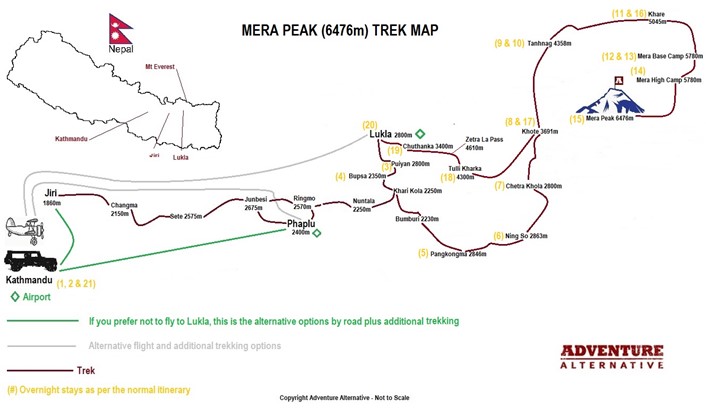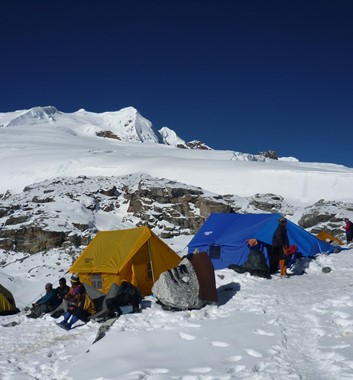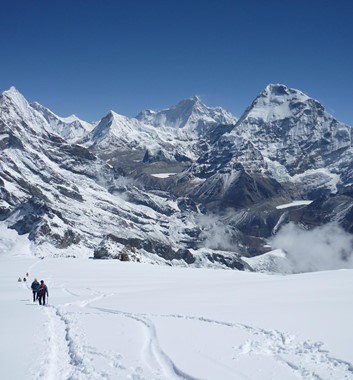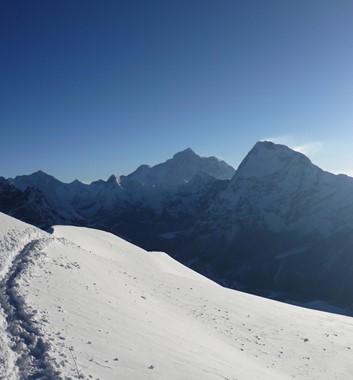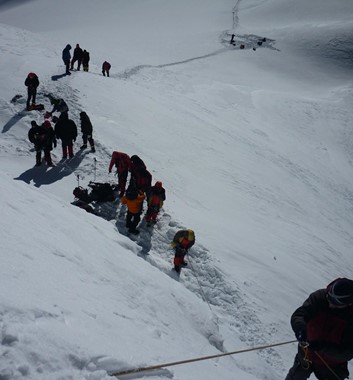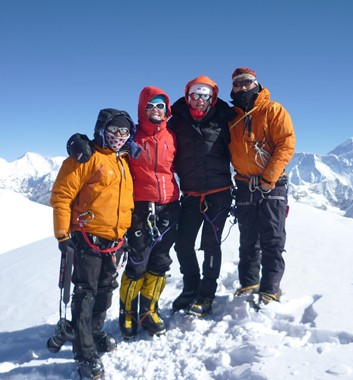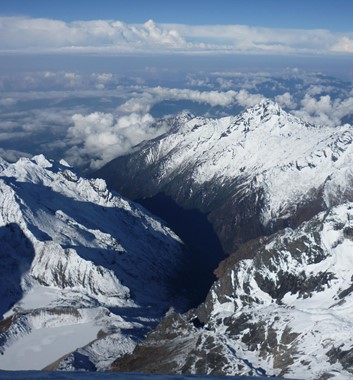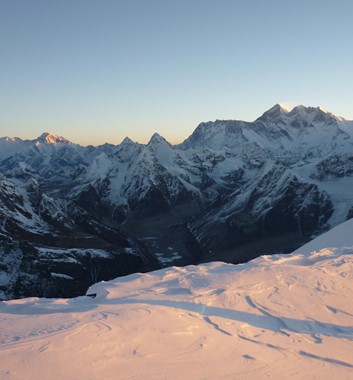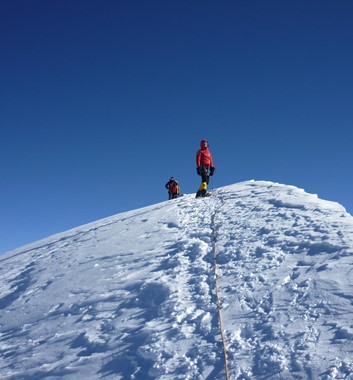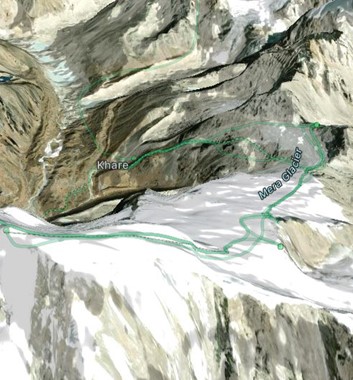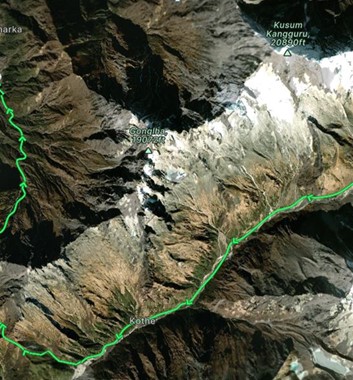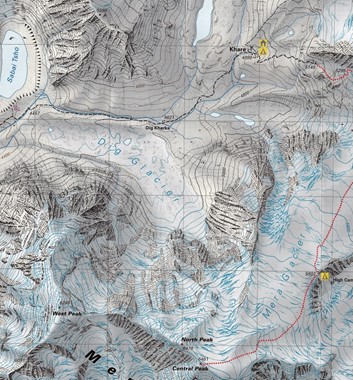Overview
Mera Peak is the highest of the peaks in Nepal that are defined as 'trekking peaks'. At 6476m it is a high mountain that requires little technical climbing on its normal route. Our guided trip is 21 days long starting from arrival in Kathmandu to the earliest date of departure home. The actual trekking and climbing days is 16 which includes two summit days.
Our groups are normally small teams of around 4 or 8 people with moderate climbing and hiking experience looking to try a snowy summit in Nepal which is not too technical but which requires basic alpine skills. Typically, groups have done some winter climbing before and learnt some techniques but never tested themselves at high altitude.
We travel as a group with a team of porters take the kit to the lodges and set up the camps on the mountain. There is a base camp and a high camp; it's possible to summit from base camp but we normally try to put in a camp on the snow.
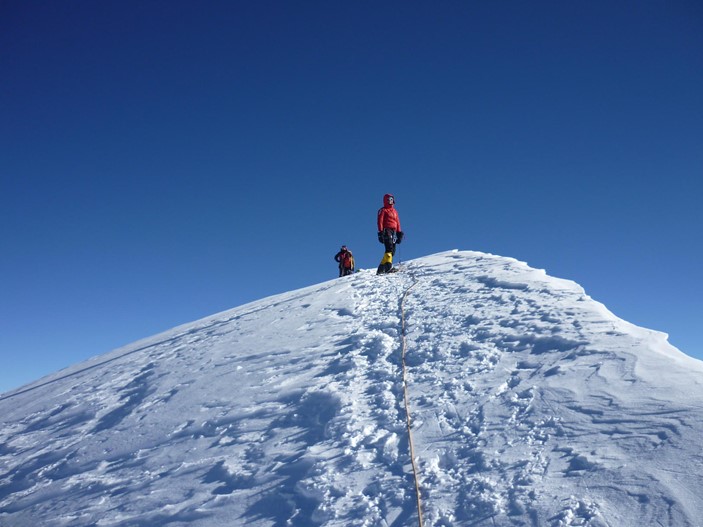
MERA PEAK ITINERARY
The 21 day trip is split into the following sections:
- Days 1 -2: After flying in to Kathmandu, a rest day to catch up on sleep and get over jet lag.
- Days 3 - 11: Drive to Paphlu and trek for 9 days to the village of Khare near Mera Peak
- Days 12 - 16: The ascent of Mera Peak over 5 days includes camping high and two possible summit days
- Days 17 - 19: Descent is a 3 day hike back to Lukla over the Zetra La
- Days 20 - 21: Return flight to Kathmandu and flight home
| Day | Trek Days | Elevation | Itinerary |
|---|---|---|---|
| 1 | 1400m | Arrive Kathmandu, transfer to hotel | |
| 2 | 1400m | Rest day in Kathmandu | |
| 3 | 2400m | Kathmandu to Paphlu by road - 8 hrs | |
| 4 | 1 | 2100m | Paphlu to Nunthala |
| 5 | 2 | 2360m | Nunthala to Bupsa |
| 6 | 3 | 2846m | Bupsa to Pangkoma |
| 7 | 4 | 2850m | Pangkoma to Ningso |
| 8 | 5 | 3000m | Ningso to Chetra Khola |
| 9 | 6 | 3550m | Chetra Khola to Khote |
| 10 | 7 | 4360m | Khote - Tangnag |
| 11 | 8 | 5100m | Tangnag - Khare |
| 12 | 9 | 5300m | Khare rest day |
| 13 | 10 | 5300m | Khare - Mera La (5413m) then Mera BC |
| 14 | 11 | 5800m | Mera High Camp |
| 15 | 12 | 5100m | To Mera Peak (6476m) |
| 16 | 13 | Additional summit day | |
| 17 | 14 | 3550m | Khare to Khote |
| 18 | 15 | 4200m | Khote - Tulli Kharka - Zetra La (4610m) - Chuthanka |
| 19 | 16 | 2840m | Chuthanka - Lukla |
| 20 | 1400m | Lukla - Kathmandu by air and back to hotel. | |
| 21 | Flight out of Kathmandu |
Note: mountain itineraries cannot be guaranteed, the guide has the option to change the programme according to the many factors that determine safety and potential success. This may be weather, the health of the group, or any changes in circumstances. Please take the above with a degree of openness and flexibility which reflects the fact that this is a high altitude peak.
The climb of Mera Peak
Mera Peak is not technically demanding but it is high at 6476m and has a long summit day, and you are of course open to the elements. You need to take care of your hydration and maintain a slow manageable pace. The snow route itself is not steep, but it is a big day out and it will sap your strength.The high altitude does not just affect your strength, it affects your whole metabolism, so expect your appetite and sleep to be altered. Change your diet to a simpler one with less fried and fatty foods and more slow energy carbohydrates. Drink much more than usual, and get as much rest as you can.
You will need to be comfortable moving on a man rope, clipping in and maintaining an equal pace to everyone else on the line. You also need to be familiar with walking on crampons and being able to self arrest with your walking axe. We use a high camp for this peak so experience camping on the snow and keeping warm, dry, hydrated and well fed is important to ensure you're in the best shape for summit day. We have plenty of time on the walk in, which is stunning, to practice the skills needed.
Reasons for people turning back include mainly: tiredness, lack of energy in the muscles and just plain running out of gas on the day, gastro-intestinal problems (often from several days before), and of course altitude sickness. Altitude plays a part in all of these issues, but the best advice is always to eat well, drink well, sleep well and go slowly.
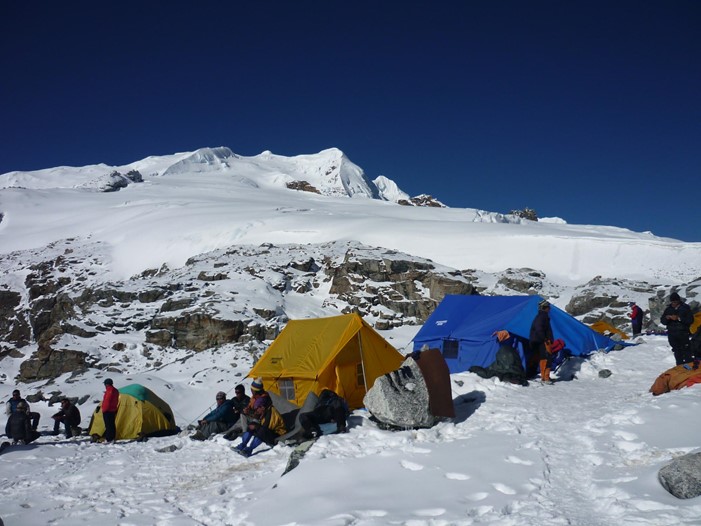
High camp on the mountain
MERA PEAK ROUTE MAP
Click on the map for a larger version
Satellite images of route
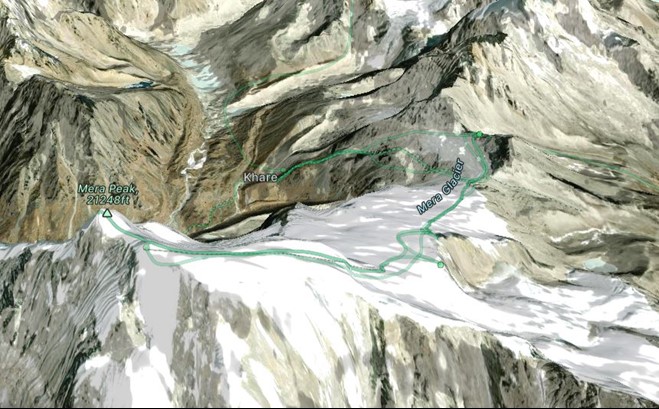
This image shows the village of Khare which is the highest nearby village and then the route circling round to the base of the glacier and the position of the high camps.
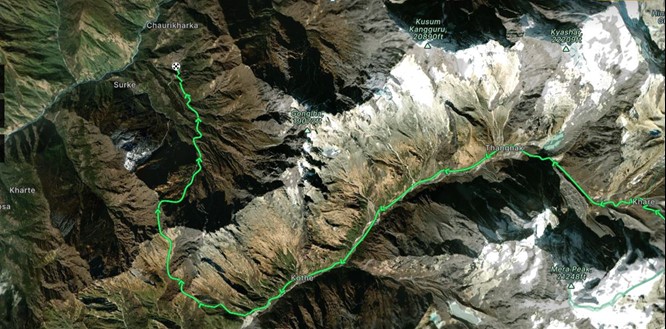
This image shows the route from the mountain peak back to Lukla via the Zetra La (Pass) which is normally done over three days.
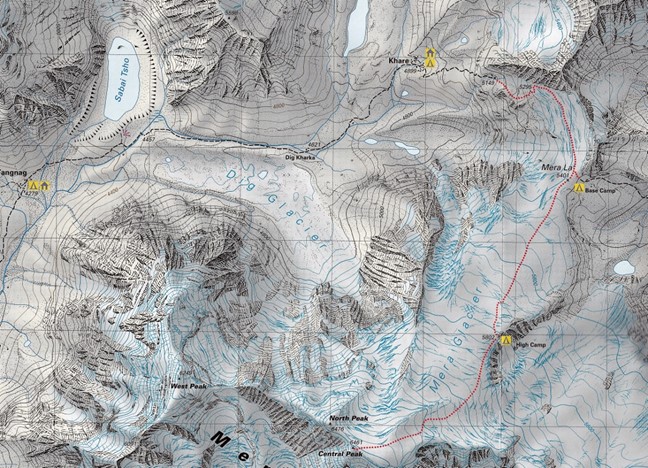
Map showing the position of base camp and high camp and the central peak.
ACCOMMODATION ON THE MERA PEAK CLIMB / TREK
Accommodation on the trek, before and after the climb of Mera Peak, is in comfortable lodges run by local families, unless people specify a preference for tents. Each lodge has a central communal area with stove, while the bedrooms are unheated with two beds and mattresses, blanket and pillows. You will need to bring a sleeping bag. The lodges generally have showers which are powered by gas and some use the infamous ‘drop’ toilets, though most now have flush systems now.
Food on the trek is very good quality, and a mixture of local Nepali / Sherpa food and western recipes. The local Dal Bhat or Momos are an excellent choice and burgers & chips are a common meal in Lukla, however less likely on the trek to Mera Peak as this area is not as developed, nor busy as the main trail north of Lukla to Everest. You will find everything from beer to batteries to Mars bars available in the lodges and local shops along the trail a Nepal price guide can be found here.
At Mera Peak base and High camp we will be in mountain tents usually sleeping two persons per tent. You should bring a 4 season sleeping bag and also a good quality sleeping mat. For lower down you may wish to use a sleeping bag liner to sleep in a open zipped 4 season bag, so that you don't get too hot. All equipment can be rented very easily.
TRAINING FOR MERA PEAK
We do recommend that you embark on a good fitness programme at least six weeks prior to your trip though, and one that builds up general stamina and specific leg muscle groups. There is nothing like hiking with a rucksack to train for this type of trip, so the best advice is to get out into the hills as often as you can. You are likely to carry about 10 kilos in your day sack so this is a good weight to work with.
If you are going to be using the gym then concentrate on step machines which work on the thigh and calf muscles, and try to build your heart rate up to 50% above resting rate. Any cardiovascular activity like swimming is good, but it must be added to other exercises to be effective. Exercise groups like body pump, Pilates and aerobics are all excellent preparation for a trip like this, especially those which work on core strength, balance and stability.
Previous winter walking and use of mountaineering equipment is a bonus however the guides will offer training whilst you're trekking to the peak, so you will have time to learn and practice the skills needed such as clipping into a rope and walking safely with the group.
Testimonial:
"I only have good things to say about Adventure Alternative. Gavin, the owner, is very knowledgeable and gets personally involved in the trips they're selling. It's a caring company -- they care about their clients, their staff, and the communities in which they operate. The trek I went on was the best trip I've ever made. I could've been pushed further, but am happy they took it relatively easy on this as one of my earlier treks. Nice to see I've got more to give for future treks/climbs. The guides and porters were excellent, all from the same area, and so knew each other and Gavin. They were knowledgeable, fast, strong and trustworthy."
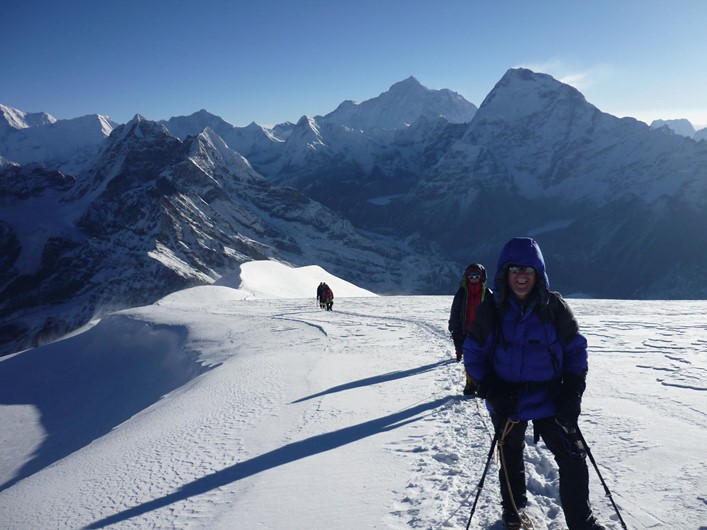
Summit day route is not highly technical but it is high, the altitude will make it physically demanding.
MERA PEAK SUPPORT TEAM
From your first enquiry and in the build up to your trip you'll have direct access to experienced and professional guides and climbers for advice or to ask questions. Then, on arrival in Nepal, you'll meet Tsering, our operations manager in Kathmandu who organises all the staff, equipment, permits and hotel arrangements. He is also the main link between you and the UK office when you are in Nepal.
- You will travel with our qualifiedguides who not only lead trekking groups but are experienced in high altitude expeditions.
- Porters' health and welfare is constantly monitored by local and UK trekking group leaders.
- All the staff in our UK office have been to Nepal and we are qualified mountain professionals so you can chat to people who understand what it's like to go up for the first time, before you go.
- We provide insurance cover for all of our Sherpa guides and local staff in the event of an accident or need for repatriation.
- Preparation information and support is available to help you plan.
- We advise you to read our advice on altitude health and acclimatising safely.
The porters will carry your main bag up to a maximum weight of 15 kgs and cater for all the group needs, you will also have your guide and climbing guide with you throughout to ensure you are safe and happy.
You can speak directly with Gavin Bate about your proposed climb of Mera Peak and have the benefit of somebody who has climbed the mountain many times and who will go through the whole expedition from start to finish. In the office you will find friendly and knowledgeable staff who will give you the time to discuss through all your preferences and questions.
MERA PEAK EMERGENCY AND EVACUATION
Mera Peak is not far from Lukla, which has a good hospital and an airport for evacuating injured people. It is possible to get a helicopter into some areas of the walk in to Mera but this is totally dependent on weather and visibility. In the event of an emergency the initial job of moving a casualty will be the responsibility of the team itself and the guide and porters and anybody else nearby. The task will be to move the casualty to the nearest safe place and then to a point where an evacuation can be made. Bad weather is the most common reason for delaying helicopter assistance so it's important to acknowledge that there is a requirement for self-sufficiency and self-management in the mountains.
Another option for getting to lower altitude if someone is feeling ill is to rent a horse locally, which costs about $150.00 per day.
I helicopter evacuation can be organised through your insurance company but there will need to be some direct communication with the insurance company to open a case and explain the circumstances. This will require you to have your policy number, name and address and the date on which you paid for the insurance policy.
MERA PEAK KIT LIST
- Large duffle bag or rucksack & liner
- 45 Ltr day pack
- Stuff sacks, waterproof, various sizes
- Expedition Jacket, primaloft or down
- Waterproof jacket and trousers, goretex or equivalent (softshell)
- Gaiters
- Trekking trousers and shorts, Tshirts, shirts
- Fleece or woollen tops
- Base layer tops and bottoms
- Thin socks and thick socks
- Warm hat, buff/balaclava, sunhat
- Liner gloves, warm gloves, mitts
- Sunglasses Cat 3 UV polaroid
- Mountaineering boots graded B1 or B2 to accommodate crampons
- Trekking boots and hut shoes
- 4 season sleeping bag (comfort temperature -20C) and compression sack
- Thermarest or thick foam sleeping mat for camping only
- Walking poles
- Head torch & spare batteries
- 2x 1 litre drinks bottles and covers
- Pee bottle
- 12 point crampons
- Mountaineering harness
- Walking axe & leash
- Climbing slings 2 x 120cm
- Screwgate karabiners x 2
- Ascender (jumar)
- Prussic loop
- Wash Kit and first aid, towel
We have a comprehensive list of gear for the trekking peaks of Nepal.
Items available for rent from Adventure Alternative (pick up in Nepal)
Mountaineering Harness
Descender, ascender, karabiners and slings
Crampons
Walking Axe
Sleeping bag
Boots for the climb need to be of a type that will allow fitting of crampons. They also need to be warm and fitted well to your feet. For Island Peak you will need boots graded at least B1 for crampon use. If you are planning on doing more mountaineering in the future on higher or colder routes it may be worth investing in B2 hybrid or B3 rigid Plastic boots both of which will also be suitable for Island Peak. Full 8000m triple boots are not needed for this climb but could be used if you already have them.
Personal first aid kit contents
Paracetamol and Ibuprofen
Antiseptic Wipes, Adhesive Plasters, Blister Plasters, Zinc Tape
Antihistamine tablets
Sunblock Cream, Lip Salve
Water Purification Tablets
Loperamide tablets
Rehydration Sachets
Personal Medication as required, eg. Anti-Malarials, Asthma Inhalers, Insulin, Epi-Pen etc
Throat Lozenges
Crepe Bandage
Hydrocortisone Cream
Prochlorperazine tablets (for sickness/nausea)
Acetazolamide tablets also known as Diamox (altitude prophylactic; prescription required)
Note: you must check with your GP for your personal suitability to all medicines and their possible side effects and interactions. Please inform us of the details of all regular medication that you intend to use though the course of your trip and any relevant allergies and medical history related to them. You also need to check the requirements and regulations of the airline and all countries visited in relation to medications. For example; laws governing transport of some pain control medication and the need keep insulin at a suitable temperature, ie not in the cargo hold.
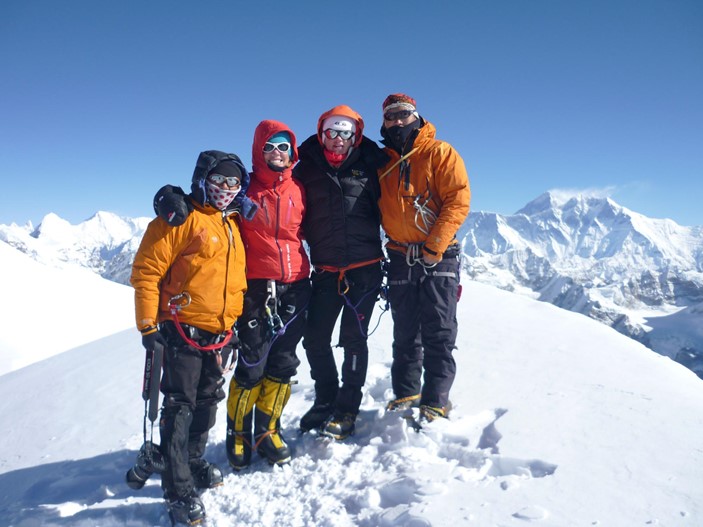
Do have a read of our various Blogs about treks in Nepal and also the 'More Information' section, both have tabs on this page and will answer every question you may have! We also have a lot of useful information on our Nepal Preparation page.
Dates & Bookings
Cost
Mera Peak cost £2695.00 per person
Cost per person is for a minimum group of two. A single person supplement of £750.00 would apply for the trek and climb part of the trip.
INCLUDES
- In-country logistics & support including airport transfers (Kathmandu transfers) if needed
- Internal flights or road transport to the start of trek depending on what is used
- English speaking guide for trekking and climbing
- Porters to carry main gear up to 16 kgs
- Accommodation in lodges or tea houses, including all meals
- Mera Peak climbing permit and local area permits
- Group camping equipment for the base camp and any ropes that are needed
- Staff insurances and food/accommodation allowances
EXCLUDES
- Return flight to Kathmandu
- Accommodation in Kathmandu - you can add this to your booking. Click here for details
- Travel and medical insurance - please ensure the policy covers non-technical trekking peak to the height of Mera (~6500m)
- Personal expenses in Kathmandu and on trek including mineral water, hot and soft drinks, charging and boiled drinking water
- Summit bonus for guide (70,000 rupees or ~£420.00 which is paid collectively by the whole group)
- Tips and summit bonuses - more information on figures here.
A deposit of £100 is required on booking to secure your place and we ask that the remaining balance (trip price minus the deposit) is paid in full four weeks prior to your departure.
Travel Insurance
Travel insurance will need to be purchased by each team member to cover all costs associated with medical, rescue, equipment, cancellations etc. This should be purchased as early as possible to ensure cancellation coverage in case of any issues arising that cause you to cancel your trip. The policy must be checked for validity in the regions through which we will be travelling and also for trekking/mountaineering to 6476m.
FLIGHT DELAYS IN LUKLA
The mountain flight in and out of Lukla which is where most treks begin and end in the Khumbu (Everest) region can be delayed due to bad weather. Normally it is for about 24 hours but it can be longer. We recommend you allow some time in Kathmandu after the specified day of the internal flight just in case. There is more information about Himalayan flight delays.
Some people choose to cancel the internal flight and book a helicopter which can fly below the cloud level and is not so determined by the weather. This is possible but there are no fixed prices for a seat on the helicopter. There are now around 12 helicopter companies operating and we can check them all for you.
For a one way place on the helicopter to Lukla can cost around $500.00 minimum. The cancelled portion of your aeroplane flight can be refunded and used to offset this figure, which is about $170.00 for a one way sector, so there would be a balance to pay for the helicopter. You can use your credit card to cover off this additional expenditure.
Unfortunately there is nothing we can do if the flight is delayed. Sometimes you can end up waiting in the airport from early hours to get the 'green light' to go, only to find yourself back in the hotel by mid morning. People do get very frustrated because it can impact on the trekking itinerary. A helicopter is one option, or else to wait until the weather improves. However, if it does not then very quickly a queue of people at either end can build up, and it is always hard to get priority for when the weather clears. The airline companies put as many planes on as possible to clear the backlog.
We try to assist as best we can, but it's important to accept that the route has this potential delay and also that it's advisable to book the international flight home a little later in case the delay affects your return ticket.
There is another option which is to drive to Paphlu and then take a jeep on the new road as far as it will go and then walk to Lukla. This option takes more days - three in total each way currently - and there is a saving but only of about $70 compared to the flight.
Photos
Extras

3 season sleeping bag
A good quality 3 season synthetic mummy shaped bag rated to a low of -12°C and a comfort rating of -5°C. Comes with a liner.

Trekking poles
A pair of adjustable trekking poles.

Crampons
C1 strap-on crampons suitable for most boot types - B1, B2 or B3 rated. They also come with a bag and anti-balling plate.

Walking Axe
Straight walking ice axe with leash.

Climbing Harness
Standard harness for clipping into a rope and moving safely across glaciated ground

Karabiner
One pair of locking karabiners. Either assymetric D shape or oval, but all have locking gates.

Climbing Sling
120cm tape sling.

Climbing Helmet
Wild Country Fusion (fits head circumference 56-63cm). Polypropylene shell with EPS foam inner, with twistlock and adjustable chinstrap and headlight mount.

Hotel Manang
3 nights twin/double standard room in the heart of Thamel in Kathmandu. Hotel Manang is a 4 star establishment with excellent facilities, spacious ensuite rooms and a good restaurant.

Yak and Yeti Hotel
3 nights twin/double standard room in this luxury 5 star hotel offering a blend of modern day sophistication and cultural heritage with its 100-year-old palace and the newly designed structure of the hotel.

Kathmandu Guest House
3 nights B&B in a standard twin or double in the famous 4 star Kathmandu Guest House in Thamel, central Kathmandu. KTMGH is set in beautiful grounds with a number of restaurants and gardens, shops and museum pieces.

Kathmandu Eco Hotel
Budget hotel near city centre, price is for 3 nights double or twin room.
Choose a scheduled date or contact us to set up private dates or a bespoke itinerary. The minimum deposit is £100.00 and the balance is due four weeks before travel.
I only have good things to say about Adventure Alternative. Gavin, the owner, is very knowledgable and gets personally i…
Read More Monica Tusch- Duration 22 days
- Numbers 10
- Altitude 6476m
- Accommodation Lodges/tents
- Challenge Difficult
- Nepal trek food & lodging
- Nepal trekking seasons
- Nepal Trek emergencies
- Nepal trip preparation
- Health and altitude
- Tipping advice
- Mountaineering Preparation
- Travel Insurance
- Trekking boot advice
- Mountain boots and crampons
- High altitude climbing
- Acclimatising safely
- Kathmandu Accommodation
- Nepal trek kit list
- Nepal: Local price guide
- Hygiene on trek
- Travel vaccinations
- Sleeping bag advice
- Porters rights
- Himalayan Flight Delays
- Guest House in Kathmandu


